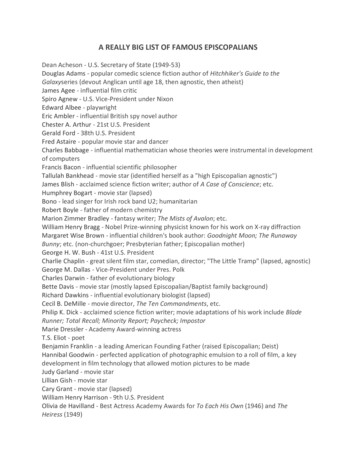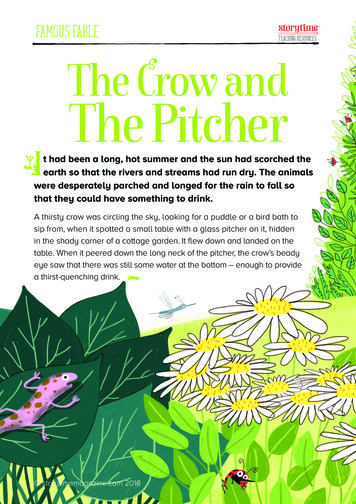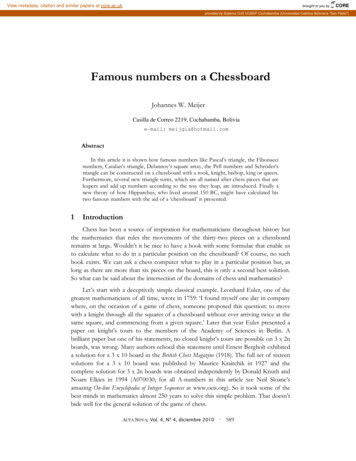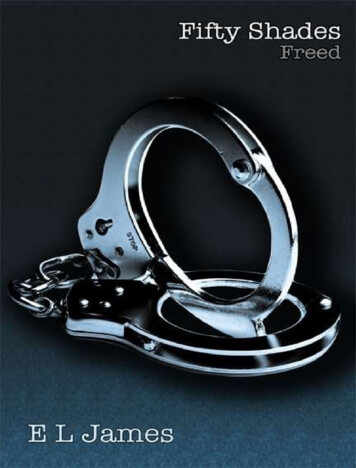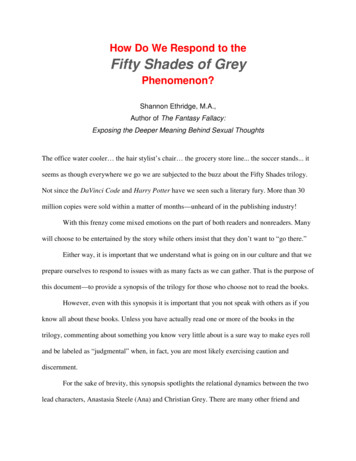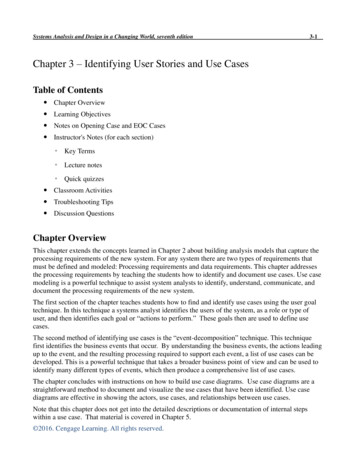
Transcription
FIFTY FAMOUS STORIESRETOLD
FIFTY FAMOUSSTORIES RETOLDBYJAMES BALDWINYESTERDAY’S CLASSICSCHAPEL HILL, NORTH CAROLINA
Cover and arrangement 2005 Yesterday’s Classics.This edition, first published in 2005 n of the work originally published byAmerican Book Company in 1896. For a listingof books published by Yesterday’s Classics, pleasevisit www.yesterdaysclassics.com. Yesterday’sClassics is the publishing arm of the BaldwinProject which presents the complete text ofdozens of classic books for children atwww.mainlesson.com under the editorship of LisaM. Ripperton and T. A. Roth.ISBN-10: 1-59915-006-9ISBN-13: 978-1-59915-006-2Yesterday’s ClassicsPO Box 3418Chapel Hill, NC 27515
CONTENTSKING ALFRED AND THE CAKES . 1KING ALFRED AND THE BEGGAR . 4KING CANUTE ON THE SEASHORE . 7THE SONS OF WILLIAM THE CONQUEROR . 11THE WHITE SHIP . 15KING JOHN AND THE ABBOT . 19A STORY OF ROBIN HOOD . 26BRUCE AND THE SPIDER . 32THE BLACK DOUGLAS . 34THREE MEN OF GOTHAM . 38OTHER WISE MEN OF GOTHAM. 41THE MILLER OF THE DEE . 46SIR PHILIP SIDNEY . 49THE UNGRATEFUL SOLDIER . 51SIR HUMPHREY GILBERT . 54SIR WALTER RALEIGH . 56POCAHONTAS. 60GEORGE WASHINGTON AND HIS HATCHET . 62GRACE DARLING . 65THE STORY OF WILLIAM TELL . 68ARNOLD WINKELRIED. 71THE BELL OF ATRI . 74HOW NAPOLEON CROSSED THE ALPS. 81THE STORY OF CINCINNATUS . 83THE STORY OF REGULUS . 88CORNELIA’S JEWELS. 91ANDROCLUS AND THE LION . 94HORATIUS AT THE BRIDGE . 98JULIUS CÆSAR . 102THE SWORD OF DAMOCLES . 104
CONTENTSDAMON AND PYTHIAS. 108A LACONIC ANSWER . 111THE UNGRATEFUL GUEST . 113ALEXANDER AND BUCEPHALUS . 116DIOGENES THE WISE MAN. 119THE BRAVE THREE HUNDRED. 122SOCRATES AND HIS HOUSE. 124THE KING AND HIS HAWK . 125DOCTOR GOLDSMITH. 130THE KINGDOMS . 132THE BARMECIDE FEAST . 136THE ENDLESS TALE . 140THE BLIND MEN AND THE ELEPHANT. 143MAXIMILIAN AND THE GOOSE BOY . 145THE INCHCAPE ROCK. 151WHITTINGTON AND HIS CAT . 154CASABIANCA. 167ANTONIO CANOVA . 170PICCIOLA . 176MIGNON . 181
CONCERNING THESE STORIESTHERE are numerous time-honored stories whichhave become so incorporated into the literature andthought of our race that a knowledge of them is anindispensable part of one’s education. These storiesare of several different classes. To one class belongthe popular fairy tales which have delighted untoldgenerations of children, and will continue to delightthem to the end of time. To another class belong thelimited number of fables that have come down to usthrough many channels from hoar antiquity. To athird belong the charming stories of olden times thatare derived from the literatures of ancient peoples,such as the Greeks and the Hebrews. A fourth classincludes the half-legendary tales of a distinctly laterorigin, which have for their subjects certain romanticepisodes in the lives of well-known heroes andfamous men, or in the history of a people.It is to this last class that most of the fiftystories contained in the present volume belong. As amatter of course, some of these stories are betterknown, and therefore more famous, than others.Some have a slight historical value; some are usefulas giving point to certain great moral truths; othersare products solely of the fancy, and are intendedonly to amuse. Some are derived from very ancientsources, and are current in the literature of many
lands; some have come to us through the ballads andfolk tales of the English people; a few are of quiterecent origin; nearly all are the subjects of frequentallusions in poetry and prose and in the conversationof educated people. Care has been taken to excludeeverything that is not strictly within the limits ofprobability; hence there is here no trespassing uponthe domain of the fairy tale, the fable, or the myth.That children naturally take a deep interest insuch stories, no person can deny; that the reading ofthem will not only give pleasure, but will help to laythe foundation for broader literary studies, canscarcely be doubted. It is believed, therefore, that thepresent collection will be found to possess alleducative value which will commend it as asupplementary reader in the middle primary gradesat school. It is also hoped that the book will proveso attractive that it will be in demand out of schoolas well as in.Acknowledgments are due to Mrs. Charles A.Lane, by whom eight or ten of the stories weresuggested.
KING ALFRED AND THECAKESMANY years ago there lived in England a wiseand good king whose name was Alfred. No otherman ever did so much for his country as he; andpeople now, all over the world, speak of him asAlfred the Great.In those days a king did not have a very easylife. There was war almost all the time, and no oneelse could lead his army into battle so well as he.And so, between ruling and fighting, he had a busytime of it indeed.A fierce, rude people, called the Danes, hadcome from over the sea, and were fighting theEnglish. There were so many of them, and they wereso bold and strong, that for a long time they gainedevery battle. If they kept on, they would soon be themasters of the whole country.At last, after a great battle, the English armywas broken up and scattered. Every man had to savehimself in the best way he could. King Alfred fledalone, in great haste, through the woods andswamps.1
FIFTY FAMOUS STORIES RETOLDLate in the day the king came to the hut of awoodcutter. He was very tired and hungry, and hebegged the woodcutter’s wife to give him somethingto eat and a place to sleep in her hut.The woman was baking some cakes upon thehearth, and she looked with pity upon the poor,ragged fellow who seemed so hungry. She had nothought that he was the king.“Yes,” she said, “I will give you some supperif you will watch these cakes. I want to go out andmilk the cow; and you must see that they do notburn while I am gone.”King Alfred was very willing to watch thecakes, but he had far greater things to think about.How was he going to get his army together again?And how was he going to drive the fierce Danes outof the land? He forgot his hunger; he forgot thecakes; he forgot that he was in the woodcutter’s hut.His mind was busy making plans for to-morrow.In a little while the woman came back. Thecakes were smoking on the hearth. They wereburned to a crisp. Ah, how angry she was!“You lazy fellow!” she cried. “See what youhave done! You want something to eat, but you donot want to work!”I have been told that she even struck the kingwith a stick; but I can hardly believe that she was soill-natured.2
KING ALFRED AND THE CAKESThe king must have laughed to himself at thethought of being scolded in this way; and he was sohungry that he did not mind the woman’s angrywords half so much as the loss of the cakes.I do not know whether he had anything to eatthat night, or whether he had to go to bed withouthis supper. But it was not many days until he hadgathered his men together again, and had beaten theDanes in a great battle.3
KING ALFRED AND THEBEGGARAT one time the Danes drove King Alfredfrom his kingdom, and he had to lie hidden for along time on a little island in a river.One day, all who were on the island, exceptthe king and queen and one servant, went out tofish. It was a very lonely place, and no one could getto it except by a boat. About noon a ragged beggarcame to the king’s door, and asked for food.The king called the servant, and asked, “Howmuch food have we in the house?”“My lord,” said the servant, “we have onlyone loaf and a little wine.”Then the king gave thanks to God, and said,“Give half of the loaf and half of the wine to thispoor man.”The servant did as he was bidden. The beggarthanked the king for his kindness, and went on hisway.In the afternoon the men who had gone outto fish came back. They had three boats full of fish,4
KING ALFRED AND THE BEGGARand they said, “We have caught more fish to-daythan in all the other days that we have been on thisisland.”The king was glad, and he and his people weremore hopeful than they had ever been before.When night came, the king lay awake for along time, and thought about the things that hadhappened that day. At last he fancied that he saw agreat light like the sun; and in the midst of the lightthere stood an old man with black hair, holding anopen book in his hand.It may all have been a dream, and yet to theking it seemed very real indeed. He looked andwondered, but was not afraid.“Who are you?” he asked of the old man.“Alfred, my son, be brave,” said the man; “forI am the one to whom you gave this day the half ofall the food that you had. Be strong and joyful ofheart, and listen to what I say. Rise up early in themorning and blow your horn three times, so loudlythat the Danes may hear it. By nine o’clock, fivehundred men will be around you ready to be led intobattle. Go forth bravely, and within seven days yourenemies shall be beaten, and you shall go back toyour kingdom to reign in peace.”Then the light went out, and the man wasseen no more.In the morning the king arose early, andcrossed over to the mainland. Then he blew his horn5
FIFTY FAMOUS STORIES RETOLDthree times very loudly; and when his friends heard itthey were glad, but the Danes were filled with fear.At nine o’clock, five hundred of his bravestsoldiers stood around him ready for battle. Hespoke, and told them what he had seen and heard inhis dream; and when he had finished, they allcheered loudly, and said that they would follow himand fight for him so long as they had strength.So they went out bravely to battle; and theybeat the Danes, and drove them back into their ownplace. And King Alfred ruled wisely and well over allhis people for the rest of his days.6
KING CANUTE ON THESEASHOREA HUNDRED years or more after the time ofAlfred the Great there was a king of England namedCanute. King Canute was a Dane; but the Daneswere not so fierce and cruel then as they had beenwhen they were at war with King Alfred.The great men and officers who were aroundKing Canute were always praising him.“You are the greatest man that ever lived,”one would say.Then another would say, “O king! there cannever be another man so mighty as you.”And another would say, “Great Canute, thereis nothing in the world that dares to disobey you.”The king was a man of sense, and he grewvery tired of hearing such foolish speeches.One day he was by the seashore, and hisofficers were with him. They were praising him, asthey were in the habit of doing. He thought that nowhe would teach them a lesson, and so he bade them7
FIFTY FAMOUS STORIES RETOLDset his chair on the beach close by the edge of thewater.“Am I the greatest man in the world?” heasked.“O king!” they cried, “there is no one somighty as you.”“Do all things obey me?” he asked.“There is nothing that dares to disobey you,O king!” they said. “The world bows before you, andgives you honor.”“Will the sea obey me?” he asked; and helooked down at the little waves which were lappingthe sand at his feet.The foolish officers were puzzled, but theydid not dare to say “No.”“Command it, O king! and it will obey,” saidone.“Sea,” cried Canute, “I command you tocome no farther! Waves, stop your rolling, and donot dare to touch my feet!”But the tide came in, just as it always did. Thewater rose higher and higher. It came up around theking’s chair, and wet not only his feet, but also hisrobe. His officers stood about him, alarmed, andwondering whether he was not mad.Then Canute took off his crown, and threw itdown upon the sand.8
KING CANUTE ON THE SEASHORE“Sea, I command you to come no farther!”9
FIFTY FAMOUS STORIES RETOLD“I shall never wear it again,” he said. “And doyou, my men, learn a lesson from what you haveseen. There is only one King who is all-powerful;and it is he who rules the sea, and holds the ocean inthe hollow of his hand. It is he whom you ought topraise and serve above all others.”10
THE SONS OF WILLIAM THECONQUERORTHERE was once a great king of England whowas called William the Conqueror, and he had threesons.One day King William seemed to be thinkingof something that made him feel very sad; and thewise men who were about him asked him what wasthe matter.“I am thinking,” he said, “of what my sonsmay do after I am dead. For, unless they are wiseand strong, they cannot keep the kingdom which Ihave won for them. Indeed, I am at a loss to knowwhich one of the three ought to be the king when Iam gone.”“O king!” said the wise men, “if we only knewwhat things your sons admire the most, we mightthen be able to tell what kind of men they will be.Perhaps, by asking each one of them a fewquestions, we can find out which one of them will bebest fitted to rule in your place.”11
FIFTY FAMOUS STORIES RETOLD“The plan is well worth trying, at least,” saidthe king. “Have the boys come before you, and thenask them what you please.”The wise men talked with one another for alittle while, and then agreed that the young princesshould be brought in, one at a time, and that thesame questions should be put to each.The first who came into the room wasRobert. He was a tall, willful lad, and was nicknamedShort Stocking.“Fair sir,” said one of the men, “answer methis question: If, instead of being a boy, it hadpleased God that you should be a bird, what kind ofa bird would you rather be?”“A hawk,” answered Robert. “I would ratherbe a hawk, for no other bird reminds one so muchof a bold and gallant knight.”The next who came was young William, hisfather’s namesake and pet. His face was jolly andround, and because he had red hair he wasnicknamed Rufus, or the Red.“Fair sir,” said the wise man, “answer me thisquestion: If, instead of being a boy, it had pleasedGod that you should be a bird, what kind of a birdwould you rather be?”“An eagle,” answered William. “I wouldrather be an eagle, because it is strong and brave. Itis feared by all other birds, and is therefore the kingof them all.”12
THE SONS OF WILLIAM THE CONQUERORLastly came the youngest brother, Henry, withquiet steps and a sober, thoughtful look. He hadbeen taught to read and write, and for that reason hewas nicknamed Beauclerc, or the Handsome Scholar.“Fair sir,” said the wise man, “answer me thisquestion: If, instead of being a boy, it had pleasedGod that you should be a bird, what kind of a birdwould you rather be?”“A starling,” said Henry. “I would rather be astarling, because it is good-mannered and kind and ajoy to every one who sees it, and it never tries to robor abuse its neighbor.”Then the wise men talked with one anotherfor a little while, and when they had agreed amongthemselves, they spoke to the king.“We find,” said they, “that your eldest son,Robert, will be bold and gallant. He will do somegreat deeds, and make a name for himself; but in theend he will be overcome by his foes, and will die inprison.“The second son, William, will be as braveand strong as the eagle but he will be feared andhated for his cruel deeds. He will lead a wicked life,and will die a shameful death.“The youngest son, Henry, will be wise andprudent and peaceful. He will go to war only whenhe is forced to do so by his enemies. He will beloved at home, and respected abroad; and he will diein peace after having gained great possessions.”13
FIFTY FAMOUS STORIES RETOLDYears passed by, and the three boys hadgrown up to be men. King William lay upon hisdeath-bed, and again he thought of what wouldbecome of his sons when he was gone. Then heremembered what the wise men had told him; and sohe declared that Robert should have the lands whichhe held in France, that William should be the Kingof England, and that Henry should have no land atall, but only a chest of gold.So it happened in the end very much as thewise men had foretold. Robert, the Short Stocking,was bold and reckless, like the hawk which he somuch admired. He lost all the lands that his fatherhad left him, and was at last shut up in prison, wherehe was kept until he died.William Rufus was so overbearing and cruelthat he was feared and hated by all his people. Heled a wicked life, and was killed by one of his ownmen while hunting in the forest.And Henry, the Handsome Scholar, had notonly the chest of gold for his own, but he became byand by the King of England and the ruler of all thelands that his father had had in France.14
THE WHITE SHIPKING HENRY, the Handsome Scholar, hadone son named William, whom he dearly loved. Theyoung man was noble and brave, and everybodyhoped that he would some day be the King ofEngland.One summer Prince William went with hisfather across the sea to look after their lands inFrance. They were welcomed with joy by all theirpeople there, and the young prince was so gallantand kind, that he won the love of all who saw him.But at last the time came for them to go backto England. The king, with his wise men and braveknights, set sail early in the day; but Prince Williamwith his younger friends waited a little while. Theyhad had so joyous a time in France that they were inno great haste to tear themselves away.Then they went on board of the ship whichwas waiting to carry them home. It was a beautifulship with white sails and white masts, and it hadbeen fitted up on purpose for this voyage.The sea was smooth, the winds were fair andno one thought of danger. On the ship, everything15
FIFTY FAMOUS STORIES RETOLDhad been arranged to make the trip a pleasant one.There was music and dancing, and everybody wasmerry and glad.The sun had gone down before the whitewinged vessel was fairly out of the bay. But what ofthat? The moon was at its full, and it would give lightenough; and before the dawn of the morrow, thenarrow sea would be crossed. And so the prince, andthe young people who were with him, gavethemselves up to merriment and feasting and joy.The earlier hours of the night passed by; andthen there was a cry of alarm on deck. A momentafterward there was a great crash. The ship hadstruck upon a rock. The water rushed in. She wassinking. Ah, where now were those who had latelybeen so heart-free and glad?Every heart was full of fear. No one knewwhat to do. A small boat was quickly launched, andthe prince with a few of his bravest friends leapedinto it. They pushed off just as the ship wasbeginning to settle beneath the waves. Would theybe saved?They had rowed hardly ten yards from theship, when there was a cry from among those thatwere left behind.“Row back!” cried the prince. “It is my littlesister. She must be saved!”The men did not dare to disobey. The boatwas again brought alongside of the sinking vessel.The prince stood up, and held out his arms for his16
THE WHITE SHIPsister. At that moment the ship gave a great lurchforward into the waves. One shriek of terror washeard, and then all was still save the sound of themoaning waters.Ship and boat, prince and princess, and all thegay company that had set sail from France, wentdown to the bottom together. One man clung to afloating plank, and was saved the next day. He wasthe only person left alive to tell the sad story.When King Henry heard of the death of hisson, his grief was more than he could bear. His heartwas broken. He had no more joy in life; and men saythat no one ever saw him smile again.Here is a poem about him that your teachermay read to you, and perhaps, after a while, you maylearn it by heart.HE NEVER SMILED AGAINThe bark that held the prince went down,The sweeping waves rolled on;And what was England’s glorious crownTo him that wept a son?He lived, for life may long be borneEre sorrow breaks its chain:Why comes not death to those who mourn?He never smiled again.There stood proud forms before his throne,The stately and the brave;But who could fill the place of one,—That one beneath the wave?17
FIFTY FAMOUS STORIES RETOLDBefore him passed the young and fair,In pleasure’s reckless train;But seas dashed o’er his son’s bright hair—He never smiled again.He sat where festal bowls went round;He heard the minstrel sing;He saw the tourney’s victor crownedAmid the knightly ring.A murmur of the restless deepWas blent with every strain,A voice of winds that would not sleep—He never smiled again.Hearts, in that time, closed o’er the traceOf vows once fondly poured,And strangers took the kinsman’s placeAt many a joyous board;Graves which true love had bathed with tearsWere left to heaven’s bright rain;Fresh hopes were born for other years—He never smiled again!MRS. HEMANS18
KING JOHN AND THE ABBOTI. THE THREE QUESTIONSTHERE was once a king of England whosename was John. He was a bad king; for he was harshand cruel to his people, and so long as he could havehis own way, he did not care what became of otherfolks. He was the worst king that England ever had.Now, there was in the town of Canterbury arich old abbot who lived in grand style in a greathouse called the Abbey. Every day a hundred noblemen sat down with him to dine; and fifty braveknights, in fine velvet coats and gold chains, waitedupon him at his table.When King John heard of the way in whichthe abbot lived, he made up his mind to put a stopto it. So he sent for the old man to come and seehim.“How now, my good abbot?” he said. “I hearthat you keep a far better house than I. How dareyou do such a thing? Don’t you know that no man in19
FIFTY FAMOUS STORIES RETOLDthe land ought to live better than the king? And I tellyou that no man shall.”“O king!” said the abbot, “I beg to say that Iam spending nothing but what is my own. I hopethat you will not think ill of me for making thingspleasant for my friends and the brave knights whoare with me.”“Think ill of you?” said the king. “How can Ihelp but think ill of you? All that there is in thisbroad land is mine by right; and how do you dare toput me to shame by living in grander style than I?One would think that you were trying to be king inmy place.”“Oh, do not say so!” said the abbot. “ForI”—“Not another word!” cried the king. “Yourfault is plain, and unless you can answer me threequestions, your head shall be cut off, and all yourriches shall be mine.”“I will try to answer them, O king!” said theabbot.“Well, then,” said King John, “as I sit herewith my crown of gold on my head, you must tell meto within a day just how long I shall live. Secondly,you must tell me how soon I shall ride round thewhole world; and lastly, you shall tell me what Ithink.”“O king!” said the abbot, “these are deep,hard questions, and I cannot answer them just now.20
KING JOHN AND THE ABBOTBut if you will give me two weeks to think aboutthem, I will do the best that I can.”“Two weeks you shall have,” said the king;“but if then you fail to answer me, you shall loseyour head, and all your lands shall be mine.”The abbot went away very sad and in greatfear. He first rode to Oxford. Here was a greatschool, called a university, and he wanted to see ifany of the wise professors could help him. But theyshook their heads, and said that there was nothingabout King John in any of their books.Then the abbot rode down to Cambridge,where there was another university. But not one ofthe teachers in that great school could help him.At last, sad and sorrowful, he rode towardhome to bid his friends and his brave knights goodby. For now he had not a week to live.II. THE THREE ANSWERSAs the abbot was riding up the lane which ledto his grand house, he met his shepherd going to thefields.“Welcome home, good master!” cried theshepherd. “What news do you bring us from greatKing John?”“Sad news, sad news,” said the abbot; andthen he told him all that had happened.21
FIFTY FAMOUS STORIES RETOLD“Cheer up, cheer up, good master,” said theshepherd. “Have you never yet heard that a fool mayteach a wise man wit? I think I can help you out ofyour trouble.”“You help me!” cried the abbot. “How?how?”“Well,” answered the shepherd, “you knowthat everybody says that I look just like you, and thatI have sometimes been mistaken for you. So, lendme your servants and your horse and your gown,and I will go up to London and see the king. Ifnothing else can be done, I can at least die in yourplace.”“My good shepherd,” said the abbot, “you arevery, very kind; and I have a mind to let you try yourplan. But if the worst comes to the worst, you shallnot die for me. I will die for myself.”So the shepherd got ready to go at once. Hedressed himself with great care. Over his shepherd’scoat he threw the abbot’s long gown, and heborrowed the abbot’s cap and golden staff. When allwas ready, no one in the world would have thoughtthat he was not the great man himself. Then hemounted his horse, and with a great train of servantsset out for London.Of course the king did not know him.“Welcome, Sir Abbot!” he said. “It is a goodthing that you have come back. But, prompt as youare, if you fail to answer my three questions, youshall lose your head.”22
KING JOHN AND THE ABBOT“You shall live until the day that you die.”23
FIFTY FAMOUS STORIES RETOLD“I am ready to answer them, O king!” said theshepherd.“Indeed, indeed!” said the king, and helaughed to himself. “Well, then, answer my firstquestion: How long shall I live? Come, you must tellme to the very day.”“You shall live,” said the shepherd, “until theday that you die, and not one day longer. And youshall die when you take your last breath, and not onemoment before.”The king laughed.“You are witty, I see,” he said. “But we will letthat pass, and say that your answer is right. And nowtell me how soon I may ride round the world.”“You must rise with the sun,” said theshepherd, “and you must ride with the sun until itrises again the next morning. As soon as you do that,you will find that you have ridden round the worldin twenty-four hours.”The king laughed again. “Indeed,” he said, “Idid not think that it could be done so soon. You arenot only witty, but you are wise, and we will let thisanswer pass. And now comes my third and lastquestion: What do I think?”“That is an easy question,” said the shepherd.“You think that I am the Abbot of Canterbury. But,to tell you the truth, I am only his poor shepherd,and I have come to beg your pardon for him and forme.” And with that, he threw off his long gown.24
KING JOHN AND THE ABBOTThe king laughed loud and long.“A merry fellow you are,” said he, “and youshall be the Abbot of Canterbury in your master’splace.”“O king! that cannot be,” said the shepherd;“for I can neither read nor write.”“Very well, then,” said the king, “I will giveyou something else to pay you for this merry joke. Iwill give you four pieces of silver every week as longas you live. And when you get home, you may tellthe old abbot that you have brought him a freepardon from King John.”25
A STORY OF ROBIN HOODIN the rude days of King Richard and KingJohn there were many great woods in England. Themost famous of these was Sherwood forest, wherethe king often went to hunt deer. In this forest therelived a band of daring men called outlaws.They had done something that was against thelaws of the land, and had been forced to hidethemselves in the woods to save their lives. Therethey spent their time in roaming about among thetrees, in hunting the king’s deer, and in robbing richtravelers that came that way.There were nearly a hundred of these outlaws,and their leader was a bold fellow called RobinHood. They were dressed in suits of green, andarmed with bows and arrows; and sometimes theycarried long wooden lances and broad-swords, whichthey knew how to handle well. Whenever they hadtaken anything, it was brought and laid at the feet ofRobin Hood, whom th
English. There were so many of them, and they were so bold and strong, that for a long time they gained every battle. If they kept on, they would soon be the masters of the whole country. At last, after a great battle, the English army was broken up and scattered. Every man had t


